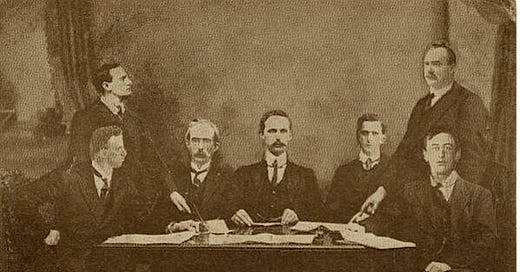There are two principle competing theories of what drives history – that Great Men through their actions influence events around them, or a structural interpretation that states events are driven through factors outside of the control of any one individual. The truth of things is that both are likely determinant. Some great men spend an awful long time cultivating that which simply never takes spark within their lifetimes, others by their own action create a conducive environment through strength of will. Pivotal moments of history could have been diverted through a different course had the decision to act been left to men of better or lesser characters.
It is with that in mind we come to the current state of things in Ireland. The nationalist movement, could it be called that, is at present many disparate groups – some of whom are nationalistic, others who are simply inhabiting the same space where nationalists find ourselves at present. It is no great surprise that we consider the latter to be impediments that need to be driven off, but that is neither here nor there.
In appraising the movement as a whole, one can in the kindest terms regard it as amateurish, uncontrolled and boorish. There are some small groups which are organised and clean looking, there are others which are driven entirely by impulse and there are many groups and individuals who are like hamsters spinning their wheels, going nowhere in a great fury of action. In synthesising the solution, it is clear that distinctions should be made between categories of people, in their quality and contributions.
The first step ought to be the professionalisation of the movement in its management – not that we need to have full-time organisers living off the contributions of its supporters, but that those who wish to succeed must act in a manner professional, courteous and adept.
If you are a political organisation, minutes must be kept and agenda must be circulated. If you are a political activist raising money, accounts must be provided for what the money is to be spent on and where the money goes in the end. If you produce content, you must think ‘what is the purpose of producing this content?’ If it is mere mental masturbation or contrarianism, we can do without.
But these procedures are not and cannot be the object of our faith and desire. Conservatives make the mistaken assumption that only through everyone adhering to the same rules can society be ordered and reasoned, hence when they acquire the power to rule, they squander it. Our enemies have no such qualms over setting precedent or undermining the ‘rule of law’. They care about the outcome of their actions, nothing else.
And so we must professionalise the way in which we conduct ourselves insofar as that leads to good governance outcomes – timely responses, clear communication, on-point-messaging. These are all things which we as Nationalists must accustom ourselves to using, but they can only be considered tools.
In Dan Breen’s My Fight for Irish Freedom, it was all too common for those sat upon the local committees of the Sinn Féin organisation to attempt to interfere with the actions of the Volunteers – through either motions disavowing the Volunteers instigating brawls with the RIC or by making claim that they could not allowed to carry hurls at demonstrations because the “local committee” had not approved it.
The men of Munster took it upon themselves to ignore such cowardice hidden behind proceduralism, and so too must we cultivate the same sense of self and action as the men whose footsteps we would follow.
The only men to whom we who are Nationalists should listen are to men like ourselves. Men who act. Men who know why we act and what we wish to achieve. We must act in a way which brings us to our goal most effectively but we must act regardless of who steps in our way. If proceduralism is weaponised against us, it must be cast aside as we cast aside the opinions and misgivings of cowards.
Listen not to the ‘expert opinion’ of men too afraid to take their own advice themselves.




